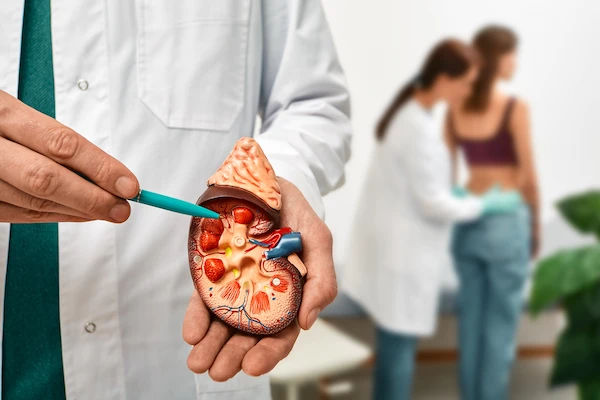Signs of Calcium Deficiency to Watch For
know about calcium, deficiency, its significance, common signs of deficiency, causes ,and how to improve the calcium levels.


Introduction
Calcium is one of the most essential minerals in our body, playing a crucial role in maintaining strong bones, healthy teeth, and proper muscle and nerve function. When your body doesn’t get enough calcium, it can lead to various health issues. Recognizing the early signs of calcium deficiency can help you take timely action and prevent complications.
In this article, we’ll discuss the common symptoms of calcium deficiency, its causes, and simple ways to improve your calcium levels for better health.
Why Is Calcium Important?
Before diving into the signs of deficiency, let’s understand why calcium is so vital:
Bone Health: About 99% of the body’s calcium is stored in bones and teeth, keeping them strong.
Muscle Function: Calcium helps muscles contract and relax properly.
Nerve Signaling: It aids in transmitting nerve impulses throughout the body.
Heart Health: Calcium supports normal heart rhythm and blood clotting.
When calcium levels drop, the body starts taking calcium from bones, weakening them over time. This can lead to conditions like osteoporosis (brittle bones) in the long run.
Consult Top Specialists for Personalised Tips
Common Signs of Calcium Deficiency
Calcium deficiency (hypocalcemia) can develop slowly, and its symptoms may not be obvious at first. Here are some key signs to watch for:
1. Muscle Cramps and Spasms
Frequent muscle cramps, especially in the legs, back, or arms.
Twitching or spasms in facial muscles (a condition called tetany).
2. Numbness and Tingling
A "pins and needles" sensation in hands, feet, or around the mouth. This happens because low calcium affects nerve function.
3. Weak and Brittle Nails
Nails may become thin, break easily, or develop white spots.
4. Fatigue and Weakness
Persistent tiredness, even after adequate rest.
General muscle weakness, making daily tasks harder.
5. Dental Problems
Weak teeth, increased cavities, or delayed tooth development in children.
Gum disease or tooth decay due to weakened enamel.
6. Bone Fractures and Osteoporosis
Bones become fragile and prone to fractures, even from minor falls.
Long-term deficiency can lead to osteoporosis (porous, weak bones).
7. Irregular Heartbeat
Low calcium can disrupt heart rhythm, causing palpitations or arrhythmia.
8. Dry Skin and Eczema
Skin may become dry, itchy, or develop patches of eczema.
9. Mood Changes
Anxiety, irritability, or depression due to calcium’s role in nerve function.
10. Difficulty Swallowing or Hoarse Voice
In severe cases, low calcium can cause spasms in throat muscles, leading to swallowing difficulties.
What Causes Calcium Deficiency?
Several factors can contribute to low calcium levels:
Poor Diet: Not consuming enough calcium-rich foods (dairy, leafy greens, nuts).
Vitamin D Deficiency: Vitamin D helps absorb calcium—without it, calcium isn’t properly utilized.
Digestive Disorders: Conditions like celiac disease or Crohn’s disease reduce calcium absorption.
Kidney Disease: Impaired kidneys may not activate vitamin D properly, affecting calcium levels.
Hormonal Changes: Low estrogen (in menopause) or parathyroid disorders can reduce calcium.
Certain Medications: Diuretics, steroids, or antacids with aluminum can interfere with calcium absorption.
How to Improve Calcium Levels Naturally
If you suspect a calcium deficiency, here are some simple ways to boost your intake:
1. Eat Calcium-Rich Foods
Dairy: Milk, cheese, yogurt.
Leafy Greens: Spinach, kale, broccoli.
Nuts & Seeds: Almonds, chia seeds, sesame seeds.
Fish: Sardines, salmon (with bones).
Fortified Foods: Orange juice, cereals, plant-based milk.
2. Get Enough Vitamin D
Sunlight helps produce vitamin D—spend 10-15 minutes in the sun daily.
Eat vitamin D-rich foods like eggs, fatty fish, and fortified products.
3. Exercise Regularly
Weight-bearing exercises (walking, jogging, strength training) strengthen bones.
4. Limit Caffeine and Salt
Too much coffee or salt can increase calcium loss through urine.
5. Consider Supplements (If Needed)
If dietary changes aren’t enough, consult a doctor for calcium supplements.
When to See a Doctor?
If you experience persistent symptoms like muscle spasms, numbness, or frequent fractures, consult a healthcare professional. A simple blood test can check your calcium levels.
Final Thoughts
Calcium deficiency is common but often overlooked. By paying attention to early signs and making small dietary and lifestyle changes, you can maintain healthy calcium levels and protect your bones, muscles, and overall well-being.
Consult Top Nutritionists
Consult Top Specialists for Personalised Tips

Mr Aritra Khan
Dietician
16 Years • PG Diploma in Clinical Nutrition,Doctorate in Public Health & Community Nutrition, Post Doctorate Fellowship in Functional Medicine & Critical Care Nutrition
Kolkata
Samaritan Clinic, Kolkata
(250+ Patients)
Dr Sumanth R
General Physician
2 Years • MBBS
Bengaluru
PRESTIGE SHANTHINIKETAN - SOCIETY CLINIC, Bengaluru
Dt. Ila Sharma
Clinical Nutritionist
18 Years • Master in food & Nutrition
Gurugram
VIPUL GREENS - SOCIETY CLINIC, Gurugram
Dr. Sasikamalam
General Practitioner
1 Years • MBBS
COIMBATORE
Apollo Sugar Clinic Coimbatore, COIMBATORE

Dr. Ramalinga Reddy
General Physician
5 Years • MBBS MD General medicine
Bengaluru
PRESTIGE SHANTHINIKETAN - SOCIETY CLINIC, Bengaluru
Consult Top Nutritionists

Mr Aritra Khan
Dietician
16 Years • PG Diploma in Clinical Nutrition,Doctorate in Public Health & Community Nutrition, Post Doctorate Fellowship in Functional Medicine & Critical Care Nutrition
Kolkata
Samaritan Clinic, Kolkata
(250+ Patients)
Dr Sumanth R
General Physician
2 Years • MBBS
Bengaluru
PRESTIGE SHANTHINIKETAN - SOCIETY CLINIC, Bengaluru
Dt. Ila Sharma
Clinical Nutritionist
18 Years • Master in food & Nutrition
Gurugram
VIPUL GREENS - SOCIETY CLINIC, Gurugram
Dr. Sasikamalam
General Practitioner
1 Years • MBBS
COIMBATORE
Apollo Sugar Clinic Coimbatore, COIMBATORE

Dr. Ramalinga Reddy
General Physician
5 Years • MBBS MD General medicine
Bengaluru
PRESTIGE SHANTHINIKETAN - SOCIETY CLINIC, Bengaluru




